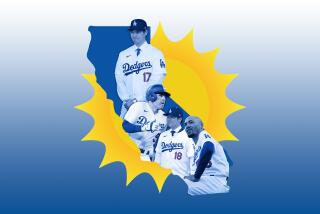Images of a Life on the Field : Baseball: Dutch Dotterer, a catcher with the Cincinnati Reds and Washington Senators in ‘50s, can fill volumes with anecdotes.
- Share via
GARDEN GROVE — To hear Henry (Dutch) Dotterer talk baseball, or the many other topics he’ll happily discuss, is to get an education without textbooks.
If there’s one thing Dutch Dotterer can do, it’s talk. About anything. For hours.
Ask him about the winter baseball leagues in Colombia, Cuba and Venezuela, and he’ll rattle off one story after another. In Spanish, if you like.
Mention the old major league ballparks and those who made them their playground, and he’s got plenty of anecdotes. After all, he worked in most of them.
Point to the photographs and a bust of Albert Einstein in the living room of his home, and Dotterer excitedly professes his admiration and respect for the scientist he considers one of the greatest men in history.
It’s all part of the charming personality of the former pro ballplayer-turned-teacher and, he hopes, full-time book store operator by this time next year.
“Oh, yes. I like to meet and talk with people,” Dotterer said. “I’m very sociable.”
For the last 16 years, Dotterer has been doing much of his talking in bilingual education classes at Santa Ana High School. But long before that, he chattered up a dust storm while squatting behind the plate in parks that aren’t even standing anymore.
Dotterer, 60, was a catcher with the Cincinnati Reds and Washington Senators. He spent several seasons in the minors and Latin American leagues, and five more in the majors, where he generally toiled as a backup. His major league career batting average was .247 with 33 runs batted in and five home runs in 107 games. In the minors, his single-season best was a .303 average with Nashville of the Southern Assn. in 1957.
Although his major league statistics were modest, the adventures he had during his travels throughout the United States and abroad were first-rate.
One of his favorites, Dotterer says, was in 1953 when he was in the first year of a two-year hitch with the U.S. Navy at Bainbridge, Md. As the catcher on the base team, Dotterer played against and befriended a young slugger on the Ft. Eustis, Va., Army team named Willie Mays.
“I was a pool table repairman with the special services unit,” Dotterer said. “That’s when I found out Willie Mays could play pool. We used to shoot pool together. When I knew him, he would give you the shirt off his back. But now you read stories about him wanting a lot of money for personal appearances, and I say, ‘That’s not the guy I knew.’ ”
Along the way, Dotterer met plenty of other personalities and characters who left him with enough material to fill volumes. Sometimes, in fact, he provided the punch line.
There was, for instance, the time in 1954 when the Reds created a zany--and dangerous--promotion Dotterer couldn’t pass up. Dotterer, fresh out of the service, traveled with the club for about a month but was not on the roster.
“We were playing the (New York) Giants at Crosley Field,” Dotterer said. “The Reds wanted to see if anyone could catch a ball dropped from higher than the Washington Monument, because I believe Gabby Hartnett (former Chicago Cub catcher) had caught one dropped from the monument. This one would be dropped from 575 feet at night (from a helicopter) with two big spotlights pointed at the ball.
“Leo Durocher was managing the Giants, and he wouldn’t let his catchers participate because he thought they would get hurt. So (Cincinnati catchers) Andy Seminick, Hobie Landrith, Ed Bailey and myself tried it. I remember Seminick putting on all the catching equipment for protection because the ball would sink into the ground when it landed. They would drop one ball first so you could follow it and then drop a second one, which was the one you were supposed to catch. I just stuck my glove out and the ball happened to drop in. I got $500 for that.”
Back then, that kind of cash went a long way. Especially for Dotterer, who signed with Cincinnati out of Syracuse for $10,000 and whose top pay was $18,000 with the Senators in 1961. That season, his last in the majors, provided another humorous chapter in Dotterer’s career; the Topps baseball trading card company printed a photograph of his younger brother, Tom, with Dotterer’s biographical and statistical information. Tom, a third baseman who never reached the majors, was a Cincinnati minor leaguer at the time.
“They just got the pictures mixed up,” Dotterer said.
In their hometown of Syracuse, where the family was well-known around sports circles, that kind of gaffe wouldn’t have happened. Dutch and Tom were standout high school players whose father, Henry, was a minor league shortstop in the St. Louis Cardinal organization and later a scout with the Reds and the New York Yankees.
After high school, Dutch attended Syracuse for two years and roomed with fraternity brother Dick Clark of American Bandstand fame. Dotterer turned pro in 1950 and was assigned to Lockport of the Pony League. He returned to the university seven years later while still playing baseball and eventually graduated with a degree in Latin American relations. His interest in that field, Dotterer says, developed after playing in South America and the Caribbean.
In the summer of 1956, Dotterer got a serious taste of beisbol Latin style when he played with the triple-A Havana Sugar Kings of the International League, then a Reds’ minor league affiliate. It was a season he says he’ll never forget.
“We started games at 9 at night (primarily because of the heat), and they didn’t end until midnight,” Dotterer said. “One of the greatest games I ever played in baseball was with the Sugar Kings in Havana. Conrado Marrero (former Senator right-hander) was pitching for us against Miami and Satchel Paige. You have never seen such a pitching exhibition. They went 13 innings, 0-0. Marrero never threw a ball over the middle of the plate. We ended up winning, 1-0, in the bottom of the 13th. When Satchel came up to bat, all you could smell was liniment.”
Dotterer also played in the four-team Cuban winter league with Cienfuegos in 1959 and caught Camilo Pascual, who led the American League in strikeouts with the Minnesota Twins in 1961, ’62 and ’63. The island was in a political upheaval at the time, with Fidel Castro and his rebels battling Fulgencio Batista’s troops, and frequently there were as many fireworks outside the ballpark as in it.
“We played a game one night, and Camilo was ready to pitch,” Dotterer said. “All of a sudden, the lights went out in the stadium, and we heard machine-gun fire. I crawled in the direction of the dugout. Finally, the lights went back on, and the game resumed. We never knew what happened.”
The following year, Dotterer got perhaps the most memorable hit of his career when he tagged a pitch by Dodger legend Sandy Koufax for a grand slam over the left-field Chinese Wall at the Los Angeles Coliseum. The slam, one of six given up by Koufax in his career, came on June 10, 1960, and gave the Reds a 4-3 victory. It was one of five home runs hit by Dotterer in the majors.
“All I remember is that he walked the man in front of me,” Dotterer said. “He was having trouble with his curve ball. When I went up to bat, I was ready. I hit the ball a ton. It would have gone out of any park.”
After he quit baseball at the end of the ’61 season, Dotterer lived in San Francisco and Reno before settling in Orange County. He’s divorced from his first wife and his two children from that marriage, Margo and Mike, are married. Dotterer lives in Garden Grove with his Cambodian-born wife, Nary, and her son from a previous marriage, Dara. They were married seven years ago.
“Her story is very touching,” Dotterer said. “She escaped Cambodia by walking 280 kilometers with her two daughters from Phnom Penh to Battambang and went from there to a refugee camp in Thailand. She was pregnant with Dara. Her husband (Sokhun) had been taken to work in what became known as ‘The Killing Fields.’ She doesn’t know what happened to him.”
Dotterer, an avid reader, plans to move with his family to Syracuse after retiring from Santa Ana High at the end of the next school year. He already has staked out a vacant store next to his brother’s liquor store and will turn it into a book store where he’ll put on sale most of the 22,000 books he recently shipped by train.
“All I want to do is make enough money to pay the lease on the shop,” Dotterer said. “But I’ll never sell my Einstein books. Those are NFS--Not For Sale.”
Einstein has been a source of inspiration and somewhat of a guiding light for Dotterer.
“He just captured my imagination and interest,” Dotterer said. “He was a philosopher as well as a scientist, so for me he’s a person who has demonstrated a mental brilliance and a perception of human life when we all ask the question, ‘What’s this all about?’ I’ve been so impressed with his work that I’ve come to admire him tremendously.”
And to make him, of course, another topic of conversation.
More to Read
Go beyond the scoreboard
Get the latest on L.A.'s teams in the daily Sports Report newsletter.
You may occasionally receive promotional content from the Los Angeles Times.










